

A larger share of Americans than ever before have gone to college and earned a degree. According to data released this month by the U.S. Census Bureau, 32.6% of Americans 25 or older have a bachelor’s degree as of 2018, a slight increase from the 32.0% share in 2017.
This increase comes even as the cost of attending college continues to rise. A large share of Americans are well aware of the risk of college debt — over 44 million Americans today have outstanding college debt. But the value of attaining a bachelor’s degree for many remains important enough that millions of Americans still choose to take on debt to earn a degree.
The average American adult with a bachelor’s degree earns about $24,000 more per year than the average adult with just a high school education. In addition to a higher earning potential, a college education also has many intangible benefits, including critical thinking skills, exposure to new ideas, and a formative social experience.
24/7 Wall St. reviewed the share of adults with a bachelor’s degree at the metropolitan area level, using data from the U.S. Census Bureau’s American Community Survey, to identify the most educated metro area in each state in 2018. Bachelor’s degree attainment rates range widely between the metro areas on this list, from 23.3% to 62.5%.
A common characteristics of many of the metropolitan areas on this list is the substantial presence of colleges and universities. The majority of the 50 metropolitan areas on this list have at least 10 postsecondary institutions — including the Boston metropolitan area, which has over 120.
In several of the metro areas on this list with only a handful of colleges and universities, those institutions tend to be large and are a substantial presence in the metro area. This is the case, for example, in Corvallis, Oregon, which is relatively small but is home to Oregon State University. Here is a list of the 30 best college towns in America.
Many of the cities on this list also have a large regional presence large employers in STEM (science, technology, engineering and math) fields and other careers that require a bachelor’s degree as a bare minimum. These cities include Austin, San Jose, Seattle, Columbus, and Minneapolis.
Educational attainment and income are related in a number of ways. Those with a college degree are more likely to be employed in higher-paying professions — including in STEM fields — and are more likely to have steady employment. The majority metro areas on this list have median annual household incomes above the national median of $61,937, and many rank among the wealthiest in the country.
It should be noted that in the case of four states — Delaware, Vermont, New Hampshire, and Rhode Island — there is only one metropolitan area and therefore these rank as the most highly-educated in the state by default. Just because a city ranks as the best educated in its state does not mean it is well-educated relative to the nation as a whole. In eight states, the most educated metro area is home to a smaller share of adults with bachelor’s degrees than the 32.6% national share. Here is a rank of all 50 states based on college attainment.
Click here to see the most educated city in every state
Click here to read our methodology
Correction: An earlier version of this article incorrectly stated that Corvallis, Oregon was home to the University of Oregon. It is in fact home to Oregon State University.

Alabama: Huntsville
> Adults with a bachelor’s degree: 40.3% (state: 25.5%)
> Median household income: $63,765 (state: $49,861)
> July unemployment: 2.8% (state: 3.3%)
> Number of college and universities: 12
Huntsville is the only metro area in Alabama where more than 40% of adults have at least a bachelor’s degree. The high educational attainment in the area is due in no small part to the area’s industry composition and job market. Major employers in and around the city include Boeing and NASA. Defense contractor and aerospace giant Lockheed Martin recently announced plans to establish a new assembly, integration, and testing facility for its hypersonic weapons and air and missile defense program in the area.
[in-text-ad]

Alaska: Anchorage
> Adults with a bachelor’s degree: 33.7% (state: 30.2%)
> Median household income: $81,037 (state: $74,346)
> July unemployment: 5.6% (state: 6.3%)
> Number of college and universities: 4
Anchorage is one of just two Alaskan metro areas, along with Fairbanks. The bachelor’s degree attainment rate in Anchorage of 33.7% is just slightly above the state rate of 30.2% and the national rate of 32.6%. Anchorage is home to four higher learning institutions, including the University of Alaska Anchorage and Alaska Pacific University.

Arizona: Flagstaff
> Adults with a bachelor’s degree: 36.0% (state: 29.7%)
> Median household income: $61,843 (state: $59,246)
> July unemployment: 5.8% (state: 4.9%)
> Number of college and universities: 4
A worker with a high level of education is typically a more desirable candidate for higher skilled jobs, and areas with high educational attainment often have lower than average unemployment. Flagstaff — the best educated metro area in Arizona — is an exception, however. The city’s unemployment rate of 5.8% is much higher than the state rate of 4.9% and the national rate of 3.7%.
The median annual household income in Flagstaff is nearly identical to the national median of $61,937 and is slightly higher than the state’s median of $59,246.

Arkansas: Fayetteville-Springdale-Rogers
> Adults with a bachelor’s degree: 31.6% (state: 23.3%)
> Median household income: $57,911 (state: $47,062)
> July unemployment: 2.5% (state: 3.4%)
> Number of college and universities: 10
Just 23.3% of adults in Arkansas have a bachelor’s degree, one of the smallest shares of any state. Even in Fayetteville, the most educated metro area in the state, 31.6% of adults have a four-year college degree, a smaller share than the 32.6% of adults who do nationwide.
Incomes tend to rise with educational attainment, and in Fayetteville, the typical household earns $57,911 a year — less than the national median of $61,937 but well above the median statewide of $47,062.
[in-text-ad-2]

California: San Jose-Sunnyvale-Santa Clara
> Adults with a bachelor’s degree: 52.9% (state: 34.2%)
> Median household income: $124,696 (state: $75,277)
> July unemployment: 2.6% (state: 4.1%)
> Number of college and universities: 26
San Jose-Sunnyvale-Santa Clara is one of only nine metro areas in the United States where over half of all adults have at least a bachelor’s degree. The high educational attainment is due in large part to the industrial composition and job market in the area. The metro area covers much of Silicon Valley, a tech hub home to companies like Apple, Facebook, and Google.
High educational attainment and a large tech sector are also reasons why San Jose has the highest median household income in the United States. The typical San Jose household earns $124,696 a year, more than twice the national median of $61,937.

Colorado: Boulder
> Adults with a bachelor’s degree: 62.5% (state: 41.7%)
> Median household income: $83,755 (state: $71,953)
> July unemployment: 2.4% (state: 2.9%)
> Number of college and universities: 8
Boulder is the best educated metro area in both Colorado and the United States. Some 62.5% of metro area adults have a bachelor’s degree or higher, compared to 41.7% of adults in Colorado and 32.6% of adults nationwide.
College-educated adults are about half as likely as those with only a high school diploma to be out of a job and, not surprisingly, unemployment in Boulder is low. Just 2.4% of metro area workers are unemployed, below both the state unemployment rate of 2.9% and the national rate of 3.7%.
[in-text-ad]

Connecticut: Bridgeport-Stamford-Norwalk
> Adults with a bachelor’s degree: 48.4% (state: 39.6%)
> Median household income: $91,079 (state: $76,348)
> July unemployment: 3.6% (state: 3.6%)
> Number of college and universities: 19
Connecticut is one of the best educated states in the country, with a bachelor’s degree attainment rate of 39.6%. Each of the four metro areas in the state is home to a larger share of college-educated adults than the 32.6% share of adults nationwide.
In the Bridgeport metro area, 48.4% of adults have at least a four-year degree, the largest share in the state. Incomes tend to rise with educational attainment, and in Bridgeport, the typical household earns $91,079 a year, the most of any Connecticut metro area and well above the median annual household income of $76,348 statewide.
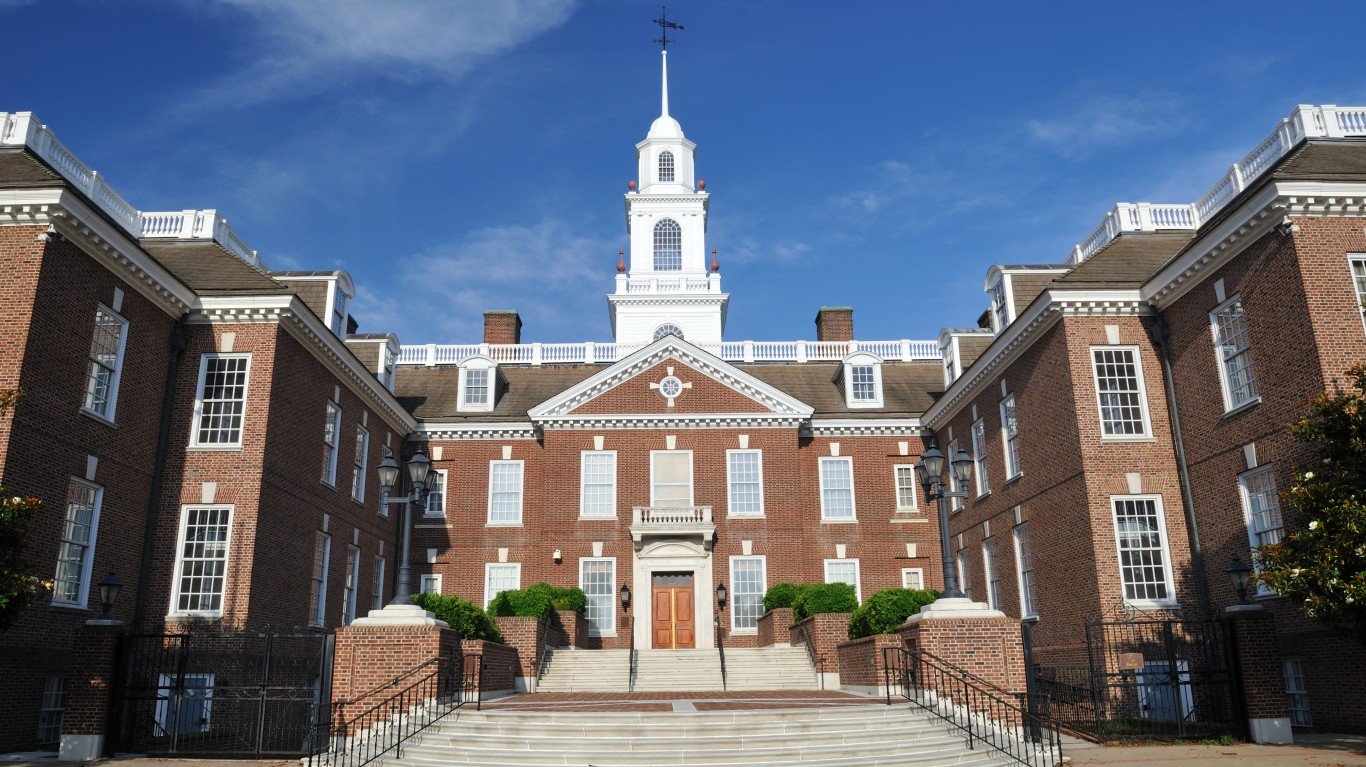
Delaware: Dover
> Adults with a bachelor’s degree: 23.3% (state: 31.3%)
> Median household income: $54,419 (state: $64,805)
> July unemployment: 3.7% (state: 3.3%)
> Number of college and universities: 5
Less than a quarter of Dover adults 25 and older hold a bachelor’s degree, well below the nationwide college degree attainment rate of 32.6% and the statewide rate of 31.3%. Yet because Dover is the only major metropolitan area in Delaware, it still ranks as the state’s most educated city by default.
Like many other cities with lower college degree attainment rates than the national average, Dover has a relatively low median household income. The typical metro area household earns just $54,419, which is about $7,500 below the national median.

Florida: Gainesville
> Adults with a bachelor’s degree: 41.6% (state: 30.4%)
> Median household income: $50,495 (state: $55,462)
> July unemployment: 3.1% (state: 3.3%)
> Number of college and universities: 9
Gainesville is home to the University of Florida, a large public university, as well as a handful of other colleges and universities. Thousands of students graduate from UF every year, and this likely contributes to Gainesville’s 41.6% bachelor’s degree attainment rate — which is more than 11 percentage points beyond the state rate.
Though higher educational levels tend to correlate with higher incomes, this is not the case in Gainesville. The metro area’s median household income of $50,495 is nearly $5,000 lower than the median income statewide.
[in-text-ad-2]

Georgia: Athens-Clarke County
> Adults with a bachelor’s degree: 40.4% (state: 31.9%)
> Median household income: $51,503 (state: $58,756)
> July unemployment: 3.4% (state: 3.6%)
> Number of college and universities: 3
Many of the metro areas on this list are home to major research institutions, and Athens, home to the University of Georgia, is one of them. In Athens, 40.4% of adults have at least a bachelor’s degree compared to just 31.9% of adults across the state as a whole. As is often the case in the metro areas on this list, Athens appears to have a healthy job market. Just 3.4% of area workers are unemployed, below both the state unemployment rate of 3.6% and the national rate of 3.7%.

Hawaii: Urban Honolulu
> Adults with a bachelor’s degree: 35.2% (state: 33.5%)
> Median household income: $84,423 (state: $80,212)
> July unemployment: 2.6% (state: 2.8%)
> Number of college and universities: 21
Of the two metro areas in Hawaii — Urban Honolulu and Kahului-Wailuku-Lahaina — Urban Honolulu is home to the largest share of college-educated adults. The 35.2% share of adults with bachelor’s degrees in the metro area is higher than the 33.5% share of adults with bachelor’s degrees statewide. Meanwhile, in Kahului-Wailuku-Lahaina, the bachelor’s degree attainment rate is just 29.5%.
[in-text-ad]

Idaho: Boise City
> Adults with a bachelor’s degree: 32.1% (state: 27.7%)
> Median household income: $61,407 (state: $55,583)
> July unemployment: 2.7% (state: 2.9%)
> Number of college and universities: 18
Of the six metro areas in Idaho, Boise City is the only one where over 30% of adults have at least a bachelor’s degree. Incomes tend to rise with educational attainment, and Boise is also the only metro area in Idaho where the majority of households earn at least $60,000 a year — a higher median income than statewide but still slightly lower than the national median.

Illinois: Bloomington
> Adults with a bachelor’s degree: 43.0% (state: 35.1%)
> Median household income: $64,822 (state: $65,030)
> July unemployment: 4.0% (state: 4.2%)
> Number of college and universities: 5
Bloomington is not just the best educated metro area in Illinois, but also one of the best educated in the country. Among Bloomington residents 25 and older, 43.0% have at least a bachelor’s degree — the 25th highest rate of any metro area in the country and well above the 35.1% state bachelor’s degree attainment rate.
Incomes tend to rise with educational attainment. In Bloomington however, the typical household earns $64,822, in line with the median income across the state as a whole.
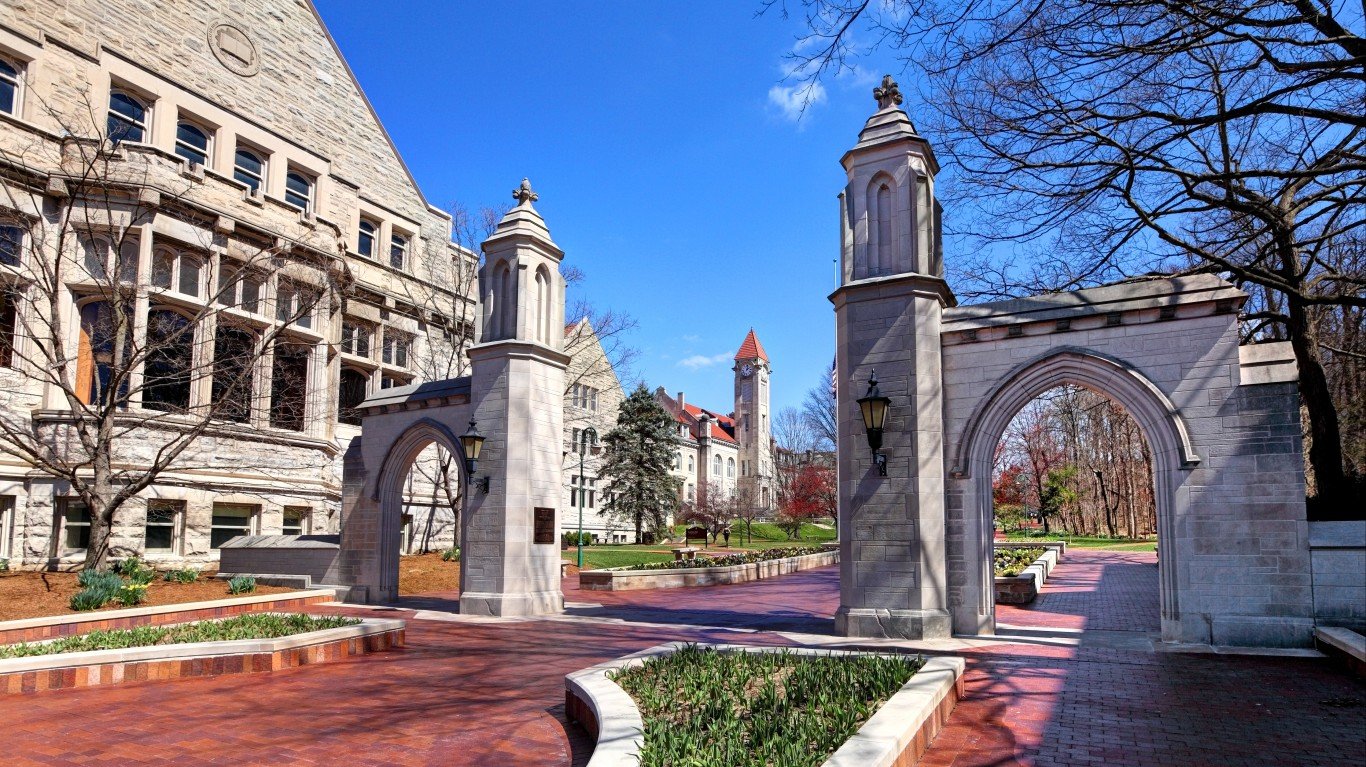
Indiana: Bloomington
> Adults with a bachelor’s degree: 42.6% (state: 27.1%)
> Median household income: $47,335 (state: $55,746)
> July unemployment: 3.5% (state: 3.4%)
> Number of college and universities: 2
Major research universities typically have large graduate student populations and employ highly educated instructors, and partially as a result, college towns often have relatively well-educated populations. Home to Indiana University, Bloomington is no exception. Of all metro area adults, 42.6% have a bachelor’s degree or higher, by far the largest share of the 12 metro areas in the state and well above the 27.1% share of adults across Indiana as a whole.
[in-text-ad-2]

Iowa: Ames
> Adults with a bachelor’s degree: 50.7% (state: 29%)
> Median household income: $54,586 (state: $59,955)
> July unemployment: 1.6% (state: 2.5%)
> Number of college and universities: 2
Ames, Iowa, is one of just nine metro areas in the country in which more than half of adults 25 and older have a college degree. Ames is home to Iowa State University and its nearly 35,000 students, so the city has a constant supply of young college graduates entering the workforce.
This level of education means there is a highly qualified labor pool in Ames, which could help explain the metro area’s very low unemployment rate of 1.6% — well below the state rate of 2.5% and the national rate of 3.7%.
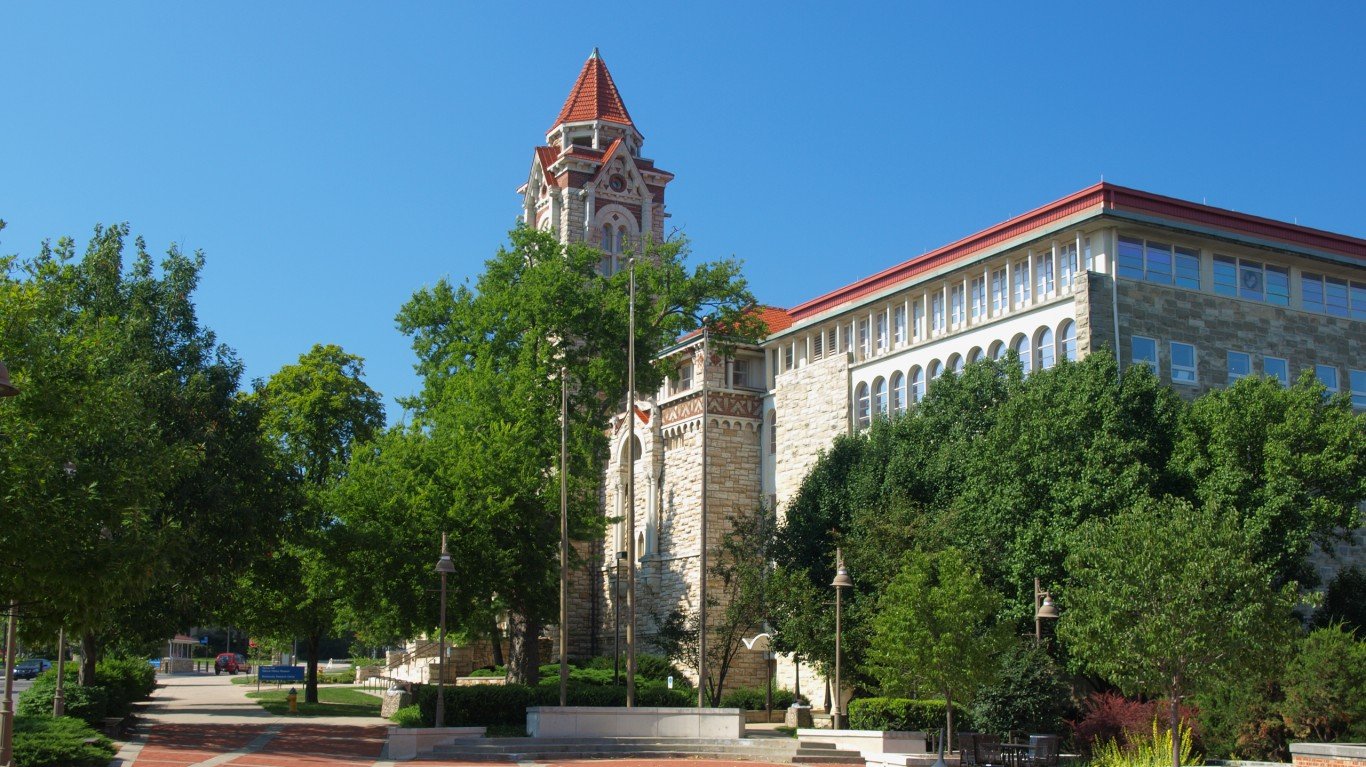
Kansas: Lawrence
> Adults with a bachelor’s degree: 56.2% (state: 33.8%)
> Median household income: $54,668 (state: $58,218)
> July unemployment: 3.0% (state: 3.3%)
> Number of college and universities: 5
Many of the best educated metro areas in the United States are college towns, and Lawrence, Kansas, is one of them. Home to the University of Kansas, Lawrence is one of only nine metro areas nationwide where over half of all adults have at least a bachelor’s degree.
Adults in Lawrence are also more likely to have completed high school than adults in the other three metro areas in the state. The high school diploma attainment rate in the area is 96.6%, well above the 91.0% rate across the state as a whole.
[in-text-ad]

Kentucky: Lexington-Fayette
> Adults with a bachelor’s degree: 38.2% (state: 24.8%)
> Median household income: $56,784 (state: $50,247)
> July unemployment: 3.4% (state: 4.3%)
> Number of college and universities: 17
Kentucky’s bachelor’s degree attainment rate of 24.8% is among the lowest of any state. Not all parts of the state, however, have similarly low educational attainment. In the Lexington-Fayette metro area, 38.2% of adults have a four-year college degree, by far the highest of any metro area in the state. Nationwide, 32.6% share of adults have a bachelor’s degree.

Louisiana: New Orleans-Metairie
> Adults with a bachelor’s degree: 30.6% (state: 24.3%)
> Median household income: $50,301 (state: $47,905)
> July unemployment: 4.0% (state: 4.3%)
> Number of college and universities: 32
New Orleans is the only Louisiana city in which more than 30% of residents 25 and older have a bachelor’s degree. Partly contributing to the higher educational attainment rate in the metro area are the numerous educational opportunities in the city. There are 32 colleges and universities in New Orleans, more than in every other metro area in the state.
Incomes tend to rise with educational attainment, and the relatively large college educated population in New Orleans likely partially explains why incomes are higher than they are across the state as a whole.

Maine: Portland-South Portland
> Adults with a bachelor’s degree: 41.5% (state: 31.5%)
> Median household income: $69,980 (state: $55,602)
> July unemployment: 2.4% (state: 3.0%)
> Number of college and universities: 16
Of the three metro areas in Maine, Portland is by far the best educated. Of all adults in the metro area, 41.5% have a bachelor’s degree or higher. By comparison, 28.0% of adults in the Bangor metro area have a college degree, and in Lewiston-Auburn just 19.5% of adults do. Across Maine, 31.5% of adults have a bachelor’s degree or higher, slightly less than the national share of 32.6% of adults.
[in-text-ad-2]

Maryland: Baltimore-Columbia-Towson
> Adults with a bachelor’s degree: 41.2% (state: 40.8%)
> Median household income: $80,469 (state: $83,242)
> July unemployment: 3.8% (state: 3.8%)
> Number of college and universities: 51
Maryland is one of the best educated states in the country, with bachelor’s degree attainment rate of 40.8% — well above the 32.6% national rate.
Of the five metro areas in the state, Baltimore-Columbia-Towson is by far the best educated. Some 41.2% of metro area adults have at least a bachelor’s degree. The area is also home to dozens of higher education institutions, including Johns Hopkins University and Loyola University – Maryland.

Massachusetts: Boston-Cambridge-Newton
> Adults with a bachelor’s degree: 49.1% (state: 44.5%)
> Median household income: $88,711 (state: $79,835)
> July unemployment: 2.6% (state: 2.9%)
> Number of college and universities: 122
Boston is the most educated metro area in the most educated state. Across Massachusetts, a staggering 44.5% of adults have at least a bachelor’s degree, well above the 32.6% share of adults nationwide. In the Boston metro area, educational attainment is even higher, with 49.1% of adults holding at least a four-year college degree.
As is often the case in the metro areas on this list, Boston has a high concentration of colleges and universities. The greater Boston metro area encompasses over 100 schools, including Boston College, Boston University, Harvard University, MIT, and Northeastern University.
[in-text-ad]
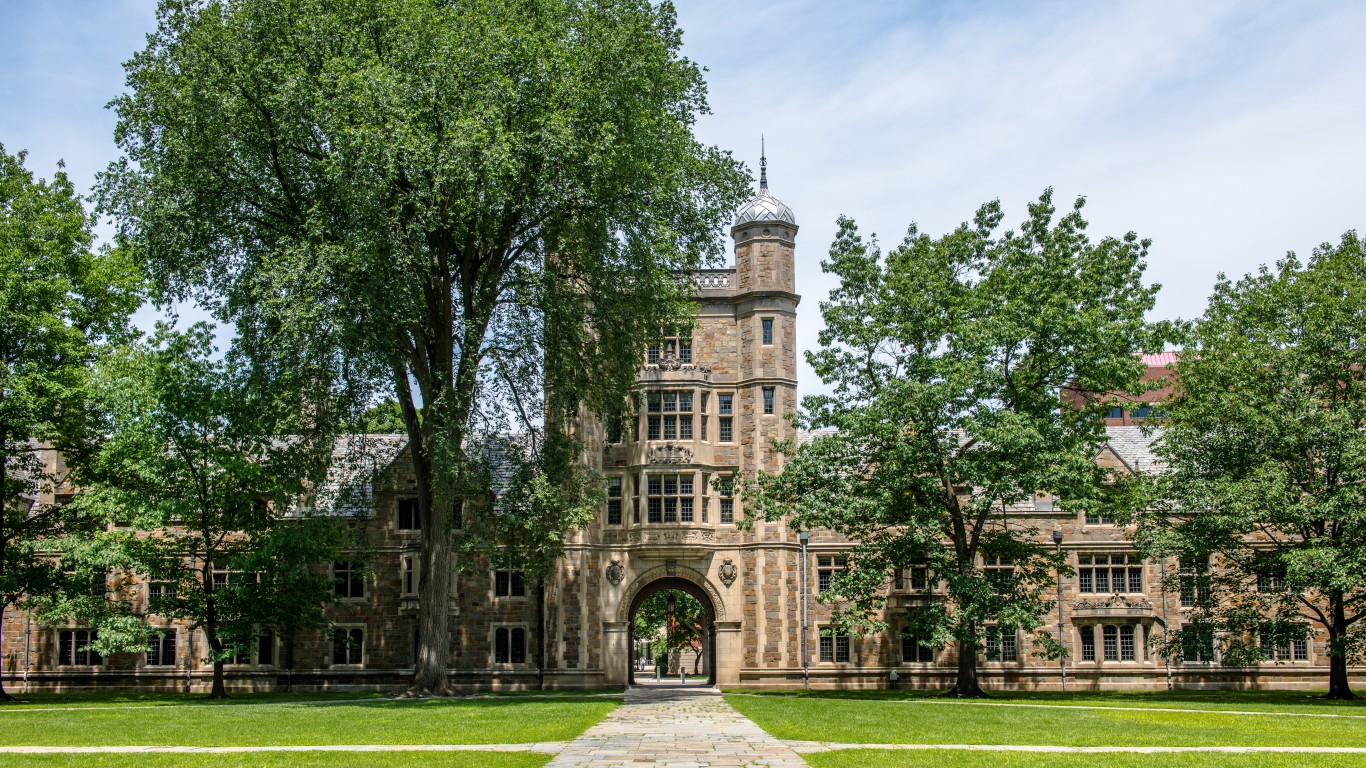
Michigan: Ann Arbor
> Adults with a bachelor’s degree: 56.4% (state: 29.6%)
> Median household income: $71,860 (state: $56,697)
> July unemployment: 3.0% (state: 4.3%)
> Number of college and universities: 5
Home to the University of Michigan, Ann Arbor is a quintessential American college town. As is the case in metro areas with major research universities, Ann Arbor residents are far more likely than most Americans to have a bachelor’s degree. The metro area is one of only nine nationwide in which over half of all adults have a bachelor’s degree or higher.
Better-educated adults have access to a broader range of high-paying jobs, and as a result, better-educated areas typically have higher median household incomes. In Ann Arbor, the typical household has an income of $71,860 a year, well above the $56,697 median income across Michigan as a whole.

Minnesota: Minneapolis-St. Paul-Bloomington
> Adults with a bachelor’s degree: 42.6% (state: 36.7%)
> Median household income: $79,578 (state: $70,315)
> July unemployment: 3.0% (state: 3.4%)
> Number of college and universities: 66
The Twin Cities have a bachelor’s degree attainment rate of 42.6%, the highest of any metro area in Minnesota. Adults with a four-year college degree are more likely to have secure, high-paying jobs than those with lower educational attainment — and as a result, they are less likely to face serious financial hardship. The Twin Cities metro area has a poverty rate of just 8.5%, below the 9.6% state poverty rate and lower than the vast majority of the nearly 400 metro areas nationwide.

Mississippi: Jackson
> Adults with a bachelor’s degree: 32.6% (state: 23.2%)
> Median household income: $55,700 (state: $44,717)
> July unemployment: 4.4% (state: 5.1%)
> Number of college and universities: 21
Mississippi has nearly the lowest educational attainment rate of any state. Just 23.2% of adults in the state have a bachelor’s degree or higher, compared to the national bachelor’s degree attainment rate of 32.6%. In Jackson, the state capital and best-educated metro area in the state, 32.6% of adults have a bachelor’s degree, in line with the comparable national rate.
As is often the case in other states, Mississippi’s best-educated city has a healthier job market than much of the rest of the state. In Jackson, 4.4% of the workforce is unemployed, compared to 5.1% of the workforce across Mississippi.
[in-text-ad-2]

Missouri: Columbia
> Adults with a bachelor’s degree: 48.4% (state: 29.5%)
> Median household income: $54,356 (state: $54,478)
> July unemployment: 2.4% (state: 3.3%)
> Number of college and universities: 9
Columbia is home to the University of Missouri, the state’s flagship university and largest college by enrollment, as well as eight other higher learning institutions. This is likely contributing to Columbia’s high bachelor’s degree attainment rate of 48.4% — well beyond the state rate of less than 30%. It is also more than 10 percentage points higher than the share at any other metro area in Missouri.
The high level of education in Columbia means many workers likely are attractive candidates for a wide variety of jobs. This partially explains the area’s unemployment rate of just 2.4%, well below the national rate and one of the lowest of any metro area in the country.

Montana: Missoula
> Adults with a bachelor’s degree: 39.7% (state: 31.7%)
> Median household income: $56,598 (state: $55,328)
> July unemployment: 3.1% (state: 3.4%)
> Number of college and universities: 1
Some 39.7% of adults in Missoula have a bachelor’s degree, by far the largest share of the three metro areas in Montana. One factor contributing to the high college attainment rate in Missoula is the presence of the University of Montana, home to roughly 11,000 students.
Nearly one in five Missoula workers is employed in the health care and social assistance field, well above the national share of employment in the field. Many jobs in the health care and social assistance sector require a college degree.
[in-text-ad]

Nebraska: Lincoln
> Adults with a bachelor’s degree: 40.6% (state: 32.4%)
> Median household income: $58,506 (state: $59,566)
> July unemployment: 2.8% (state: 3.1%)
> Number of college and universities: 15
In Lincoln, 40.6% of adults have a bachelor’s degree or higher, well above the 32.4% of adults across Nebraska as a whole. Many of the metro areas on this list are college towns, and Lincoln — home to the University of Nebraska — is one of them. Lincoln is also Nebraska’s capital, and a college degree is often required for many government jobs.
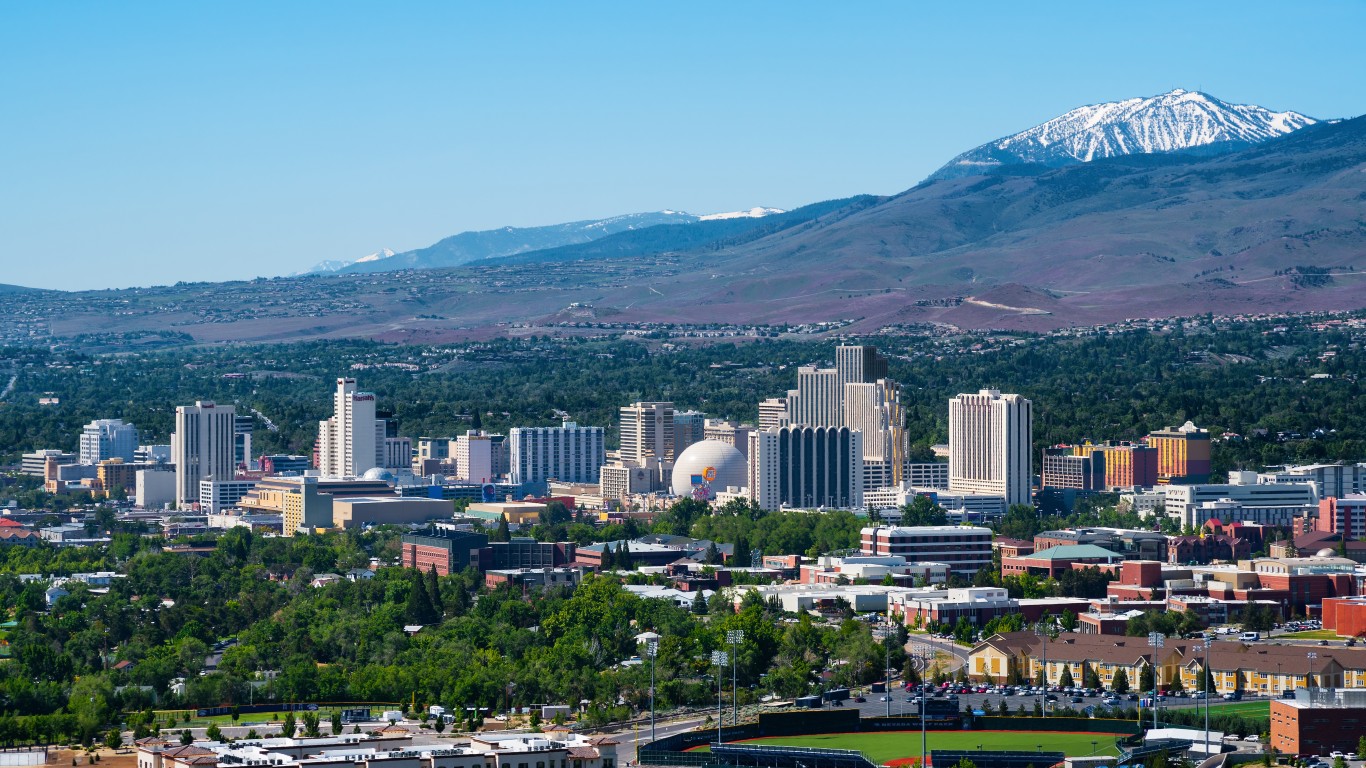
Nevada: Reno
> Adults with a bachelor’s degree: 31.3% (state: 24.9%)
> Median household income: $63,466 (state: $58,646)
> July unemployment: 3.2% (state: 4.1%)
> Number of college and universities: 10
Nevada has one of the lowest educational attainment rates in America, as less than a quarter of adults 25 and over have a bachelor’s degree. Reno is the only one of the three Nevada metro areas to have a bachelor’s degree attainment rate higher than the state. Places with higher college education attainment tend to generally have higher incomes. The typical household in Reno has an annual income of $63,466, which is the highest in the state and slightly above the national median of $61,937.

New Hampshire: Manchester-Nashua
> Adults with a bachelor’s degree: 38.6% (state: 36.8%)
> Median household income: $78,978 (state: $74,991)
> July unemployment: 2.3% (state: 2.5%)
> Number of college and universities: 15
The state of New Hampshire has one of the highest educational attainment rates in the country, with 36.8% of adults having at least a bachelor’s degree. The Manchester-Nashua metro area, which is the only metro area in the state, has a slightly higher bachelor’s attainment rate than the state, at 38.6%.
Higher educational attainment and incomes are closely tied, and Manchester is one of the more affluent metro areas in the country, with a median annual household income of $78,978, which is even higher than the state’s relatively high $74,991 median and well above the national median of $61,937.
[in-text-ad-2]

New Jersey: Trenton
> Adults with a bachelor’s degree: 42.2% (state: 40.8%)
> Median household income: $80,632 (state: $81,740)
> July unemployment: 2.9% (state: 3.3%)
> Number of college and universities: 10
The Trenton metropolitan area, which is equivalent to Mercer County, is home to a number of colleges and universities, including famed Ivy League institution Princeton University. New Jersey is tied with Maryland as having the third highest state bachelor’s attainment rate, at 40.8%, but Trenton’s attainment rate is even higher, at 42.2%, which ranks in the top 30 among all U.S. metro areas.
As is often the case in metro areas with high educational attainment, Trenton is relatively affluent. The typical household has an annual income of $80,632, making Trenton one of just 19 metro areas with a median income in excess of $80,000.

New Mexico: Santa Fe
> Adults with a bachelor’s degree: 39.4% (state: 27.7%)
> Median household income: $60,193 (state: $47,169)
> July unemployment: 4.1% (state: 4.9%)
> Number of college and universities: 7
The Santa Fe metro area is home to a number of scientific and technical employers and institutes, including Los Alamos National Laboratory, the Santa Fe Institute, and Sandia National Laboratories. The strong presence of positions in tech and research helps explain the state capital’s high educational attainment rate.
While New Mexico’s educational attainment rate is below that most states, at 27.7%, Santa Fe stands out as having a nearly 40% share of adults with a bachelor’s degree. The metro area also has a very high share of residents in health care-related jobs, which usually require a college education as well.
[in-text-ad]

New York: Ithaca
> Adults with a bachelor’s degree: 51.9% (state: 37.2%)
> Median household income: $57,276 (state: $67,844)
> July unemployment: 3.3% (state: 4.0%)
> Number of college and universities: 4
Ithaca, New York is home to the Ivy League school Cornell University as well as three other schools. The Ithaca area is by far the most highly educated metro area in New York as more than half of adults hold at least a bachelor’s degree, the sixth highest share among U.S. metro areas. The next closest metro area, New York City, has a bachelor’s degree attainment rate of 41.1%.

North Carolina: Durham-Chapel Hill
> Adults with a bachelor’s degree: 48.1% (state: 31.9%)
> Median household income: $62,114 (state: $53,855)
> July unemployment: 3.7% (state: 4.2%)
> Number of college and universities: 14
Durham-Chapel Hill is the best educated metro area in North Carolina. Some 48.1% of area adults have a bachelor’s degree or higher, compared to 31.9% of adults across the state.
Commonly known as the Research Triangle, the area has a high concentration of science and tech companies. It gets its name from the three major research universities — Duke University, North Carolina State University, and the University of North Carolina Chapel Hill — that are clustered in the area near one another. Durham-Chapel Hill’s median household income of more than $62,000 far exceeds the median income across all of North Carolina.

North Dakota: Fargo
> Adults with a bachelor’s degree: 38.3% (state: 29.7%)
> Median household income: $65,073 (state: $63,837)
> July unemployment: 2.4% (state: 2.4%)
> Number of college and universities: 9
Of the three major metro areas in North Dakota, Fargo has the highest bachelor’s degree attainment rate at 38.3%. A relatively large share of the metro area’s workforce is employed in the finance and insurance sector, as well as the information sector. Both sectors tend to consist of jobs that require a bachelor’s degree. According to IPEDS data, there are nine postsecondary institutions in the metro area, more than the other two metro areas in the state — Bismarck and Grand Forks — combined.
[in-text-ad-2]

Ohio: Columbus
> Adults with a bachelor’s degree: 37.7% (state: 29%)
> Median household income: $64,052 (state: $56,111)
> July unemployment: 3.4% (state: 4.0%)
> Number of college and universities: 48
Like the state as a whole, the majority of metro areas in Ohio have a bachelor’s degree attainment rate among adults below the national share of 32.6%. Columbus’s bachelor’s degree attainment rate is about 5 percentage points higher than the national share.
Metropolitan areas with a substantial presence of colleges and universities tend to have higher educational attainment rates. Columbus is home to Ohio State University, one of the largest schools in the country, as well as several other postsecondary education institutions. Columbus is also home to Battelle Memorial Institute, the world’s largest private, nonprofit research institution.

Oklahoma: Oklahoma City
> Adults with a bachelor’s degree: 30.7% (state: 25.6%)
> Median household income: $57,485 (state: $51,924)
> July unemployment: 2.9% (state: 3.2%)
> Number of college and universities: 36
The state of Oklahoma has one of the lowest bachelor’s degree attainment rates in the country. Even the metro area with the highest bachelor’s degree attainment rate in the state, Oklahoma City, has a lower rate than the nation. Still, it is the only metro area in the state with a college attainment rate above 30%, likely in large part due to the presence of higher learning institutions in the city.
Oklahoma City is home to several major colleges and universities, including Oklahoma City University.
[in-text-ad]

Oregon: Corvallis
> Adults with a bachelor’s degree: 53.4% (state: 34%)
> Median household income: $63,773 (state: $63,426)
> July unemployment: 3.1% (state: 4.0%)
> Number of college and universities: 2
The presence of colleges and universities in a metropolitan area tends to be tied to higher educational attainment. While there are other metropolitan areas in the state with more postsecondary institutions, such as Portland, Corvallis is a small enough metro area that higher-learning institutions represent a more substantial part of the economy. The metro area is home to the campus of Oregon State University, which is the largest employer in the city. The metro area’s 53.4% share of adults with a bachelor’s degree is the fourth highest in the country.
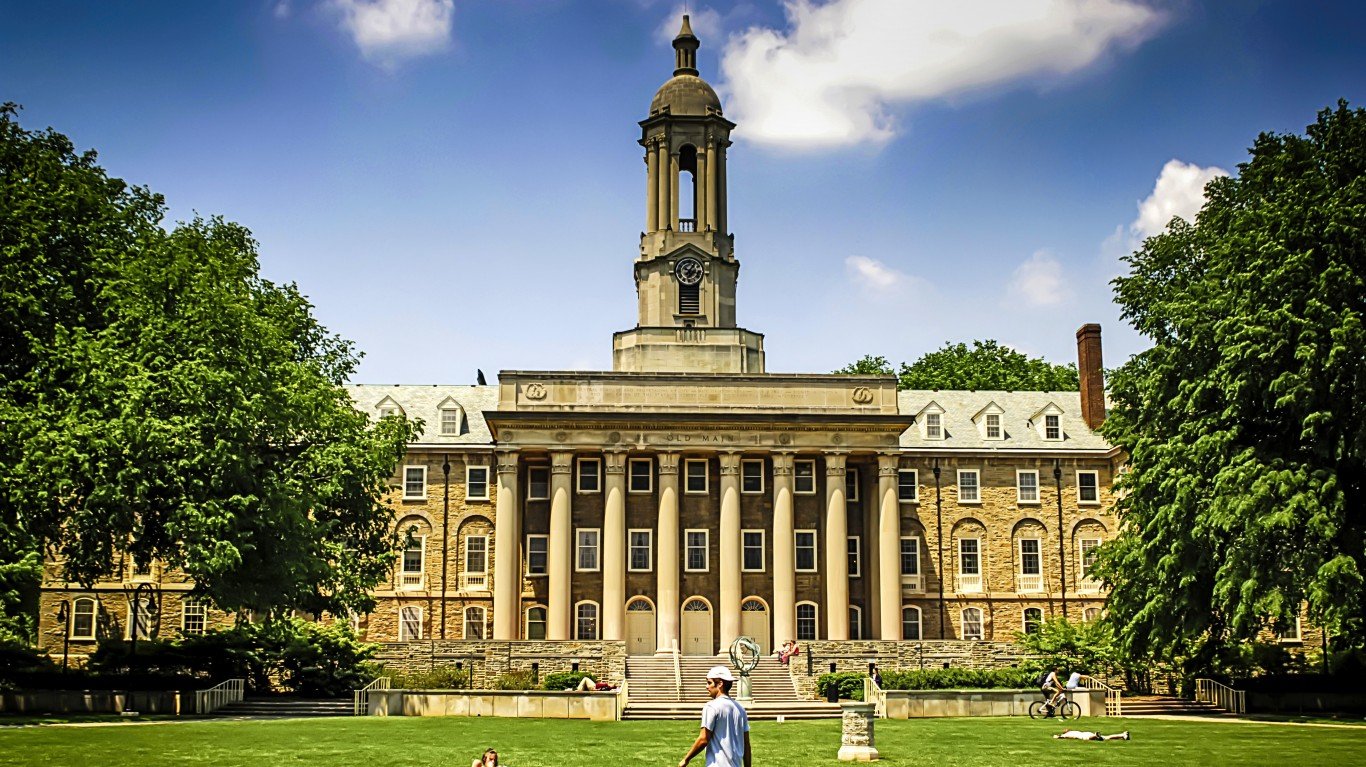
Pennsylvania: State College
> Adults with a bachelor’s degree: 46.7% (state: 31.8%)
> Median household income: $57,333 (state: $60,905)
> July unemployment: 2.9% (state: 3.9%)
> Number of college and universities: 4
The State College area, also known as Happy Valley, is home to Penn State University. The metro area’s 46.7% bachelor’s degree attainment rate is by far the highest in the state and well above Pennsylvania’s 31.8% rate.
As is often the case in the cities on this list, the best educated metro area in Pennsylvania has a strong job market. Just 2.9% of workers in State College are unemployed, compared to Pennsylvania’s 3.9% unemployment rate.

Rhode Island: Providence-Warwick
> Adults with a bachelor’s degree: 31.9% (state: 34.4%)
> Median household income: $65,083 (state: $64,340)
> July unemployment: 3.6% (state: 3.5%)
> Number of college and universities: 35
Providence-Warwick ranks as Rhode Island’s most educated city despite having a bachelor’s degree attainment rate of 31.9% — slightly below the U.S. rate. This is because Providence is the only major metro area in the state, in fact, the metro area is made up of the entire state of Rhode Island, as well as Bristol County in Massachusetts.
There is certainly no shortage of places for people in the Providence area to get a college education. The metro area is home to over 30 different higher learning institutions, including the Ivy League school Brown University.
[in-text-ad-2]

South Carolina: Hilton Head Island-Bluffton-Beaufort
> Adults with a bachelor’s degree: 39.9% (state: 28.3%)
> Median household income: $63,723 (state: $52,306)
> July unemployment: 3.1% (state: 3.4%)
> Number of college and universities: 2
Nearly 40% of adults in South Carolina’s Hilton Head metro area have a bachelor’s degree or higher, by far the largest share of the eight metro areas in the state. Adults with a four-year college degree are more likely to have secure, high-paying jobs than those with lower educational attainment — and as a result, they are less likely to face serious financial hardship. The state’s median household income of $63,723 is more than $11,000 beyond the state median.

South Dakota: Sioux Falls
> Adults with a bachelor’s degree: 33.9% (state: 29.2%)
> Median household income: $61,196 (state: $56,274)
> July unemployment: 2.4% (state: 2.9%)
> Number of college and universities: 8
Just over a third of Sioux Falls adults 25 and older have at least a bachelor’s degree, narrowly edging out the attainment rate in Rapid City, the only other major metro area in South Dakota. Individuals with a college degree are more likely to hold advanced, high-paying jobs and to have higher incomes than those with less educational attainment. In Sioux Falls, the typical household earns $61,196 a year, more than the median household income in Rapid City of $59,833 and the $56,274 median for South Dakota as a whole.
[in-text-ad]

Tennessee: Nashville-Davidson–Murfreesboro–Franklin
> Adults with a bachelor’s degree: 35.9% (state: 27.5%)
> Median household income: $65,919 (state: $52,375)
> July unemployment: 2.7% (state: 3.5%)
> Number of college and universities: 56
Nashville, the capital of Tennessee, is also the best-educated city in the state. It is the only metro area of the 10 in the state where more than one in every three adults has a bachelor’s degree or higher. In Knoxville, the second best-educated city in the state, only 28.7% of adults have a four-year degree.
Adults with a bachelor’s degree are nearly half as likely to be unemployed as those with just a high school diploma, and in Nashville, the unemployment rate stands at just 2.7%, well below the 3.5% state rate.

Texas: Austin-Round Rock
> Adults with a bachelor’s degree: 46.6% (state: 30.3%)
> Median household income: $76,925 (state: $60,629)
> July unemployment: 2.6% (state: 3.4%)
> Number of college and universities: 37
The Austin-Round Rock metro area is by far the best educated metro area in Texas, with a bachelor’s degree attainment rate of 46.6%. This is likely due to a number of reasons: The Austin metro area is home to the University of Texas, one of the largest schools in the country. It is also the state capital, and many government jobs require a college degree. Many of the major employers in Austin are large tech companies, like IBM, Dell, and Apple. These corporations tend to hire college-educated programmers and developers.

Utah: Provo-Orem
> Adults with a bachelor’s degree: 41.4% (state: 34.9%)
> Median household income: $75,344 (state: $71,414)
> July unemployment: 2.6% (state: 2.8%)
> Number of college and universities: 16
While there are many U.S. cities with high bachelor’s attainment rates and relatively low shares of adults with a high school diploma, high school and college educational attainment rates tend to be correlated. In Provo-Orem, 94.4% of adults have a high school diploma, which is the highest share in the state and the 20th highest rate among all U.S. metropolitan statistical areas. The campus of Brigham Young University, the largest post secondary institution in the state, is in Provo.
[in-text-ad-2]

Vermont: Burlington-South Burlington
> Adults with a bachelor’s degree: 45.7% (state: 38.7%)
> Median household income: $71,452 (state: $60,782)
> July unemployment: 1.7% (state: 2.1%)
> Number of college and universities: 5
The Burlington-South Burlington metro area is the only metro area in Vermont and it ranks as the most educated city by default. In this case, it is also deserving of the title as 45.7% of metro area adults hold at least a bachelor’s degree, among the highest bachelor’s degree attainment rates in the country.
Burlington area residents likely have a high standard of living as the median household income of more than $71,000 annually is about $10,000 higher than the national median and the 1.7% unemployment rate is nearly the lowest among all metro areas in the country.

Virginia: Charlottesville
> Adults with a bachelor’s degree: 47.8% (state: 39.3%)
> Median household income: $71,052 (state: $72,577)
> July unemployment: 2.6% (state: 2.9%)
> Number of college and universities: 3
Charlottesville is the best educated metro area in Virginia and one of the best educated nationwide. Of all adults in the metro area, 47.8% have a bachelor’s degree or higher, well above the 39.3% share of adults in Virginia and the 32.6% national bachelor’s degree attainment rate.
Many of the metro areas on this list are home to major research institutions and universities, and Charlottesville is home to the University of Virginia.
[in-text-ad]

Washington: Seattle-Tacoma-Bellevue
> Adults with a bachelor’s degree: 43.6% (state: 36.7%)
> Median household income: $87,910 (state: $74,073)
> July unemployment: 3.6% (state: 4.6%)
> Number of college and universities: 64
Some 43.6% of adults 25 and older in the Seattle metro area have at least a bachelor’s degree, the largest share in Washington and the 24th largest share nationwide. One factor attracting college graduates to the Seattle metro area is likely the presence of major tech companies such as Amazon and Microsoft. These companies are among the highest-paying in the nation, which may be part of the reason why the area has such a high median household income. The typical Seattle household earns $87,910 a year, far more than the $74,073 median household income for Washington as a whole. There are also dozens of major universities in the region.

West Virginia: Morgantown
> Adults with a bachelor’s degree: 38.1% (state: 21.3%)
> Median household income: $50,574 (state: $44,097)
> July unemployment: 3.8% (state: 4.7%)
> Number of college and universities: 6
West Virginia is the least educated state in the country. Just 21.3% of adults in the state have a bachelor’s degree or higher, well below the 32.6% share of adults nationwide. Not all parts of the state have low educational attainment, however. In Morgantown, 38.1% of adults have a bachelor’s degree, a larger share than in the vast majority of metro areas nationwide.
Major research universities typically have large graduate student populations and employ highly-educated instructors, and partially as a result, college towns often have relatively well-educated populations. Morgantown is home to West Virginia University, the public post-secondary institution in the state.

Wisconsin: Madison
> Adults with a bachelor’s degree: 45.7% (state: 30.0%)
> Median household income: $70,463 (state: $60,773)
> July unemployment: 2.3% (state: 3.0%)
> Number of college and universities: 16
Madison is the only one of Wisconsin’s 12 metro areas where over 40% of adults have a bachelor’s degree. Not only is the 45.7% bachelor’s degree attainment rate in the capital city metro area the highest in the state, but it is also among the highest in the country and well above the 32.6% national rate.
As is the case with many metro areas on this list, Madison is a college town. The metro area is home to the University of Wisconsin, by far the largest postsecondary institution in the state by enrollment.
[in-text-ad-2]

Wyoming: Cheyenne
> Adults with a bachelor’s degree: 26.5% (state: 26.9%)
> Median household income: $64,306 (state: $61,584)
> July unemployment: 3.5% (state: 3.6%)
> Number of college and universities: 3
Wyoming is home to two metro areas, Cheyenne and Casper. While Cheyenne’s college attainment rate of 26.5% is higher than in Casper, where 25.0% of adults have a bachelor’s degree, it is still lower than the 32.6% national college attainment rate and the 26.9% rate for Wyoming as a whole.
Individuals with a college degree are more likely to have advanced, high-paying jobs and to have higher incomes than those with less educational attainment. While Cheyenne has a higher college attainment rate than Casper, the median income in the Wyoming capital is actually lower. The typical household in Cheyenne has an income of $64,306 a year, compared to a median household income of $64,833 in Casper.
Methodology
To identify the most educated city in every state, 24/7 Wall St. reviewed the percentages of metro area adults who have earned at least a bachelor’s degree in every state. The bachelor’s degree attainment rate and high school diploma attainment rate, along with income for metro areas and for states all came from the U.S. Census Bureau’s 2018 American Community Survey.
Shares of each metro area’s workforce employed in particular industries came from the Bureau of Labor Statistics. Unemployment figures are also from the BLS and are for July 2019. The number of postsecondary institutions in each metropolitan area came from the U.S. Department of Education. Postsecondary institutions include four-year and two-year universities and colleges, as well as technical institutes and trade academies.
Washington-Arlington-Alexandria metro area, which spans the District of Columbia, Virginia, Maryland, and West Virginia, was excluded from the ranking.
Essential Tips for Investing: Sponsored
A financial advisor can help you understand the advantages and disadvantages of investment properties. Finding a qualified financial advisor doesn’t have to be hard. SmartAsset’s free tool matches you with up to three financial advisors who serve your area, and you can interview your advisor matches at no cost to decide which one is right for you. If you’re ready to find an advisor who can help you achieve your financial goals, get started now.
Investing in real estate can diversify your portfolio. But expanding your horizons may add additional costs. If you’re an investor looking to minimize expenses, consider checking out online brokerages. They often offer low investment fees, helping you maximize your profit.
Thank you for reading! Have some feedback for us?
Contact the 24/7 Wall St. editorial team.
 24/7 Wall St.
24/7 Wall St. 24/7 Wall St.
24/7 Wall St. 24/7 Wall St.
24/7 Wall St.


